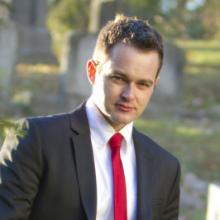death
Most days, Caleb Wilde is a funeral director, discreetly making burial arrangements and guiding survivors in a time of loss.
Wilde is an undertaker with a media presence seemingly tailor-made for the age of disclosure.
His blog, “Confessions of a Funeral Director” has more than 80,000 monthly readers, a Twitter following of more than 16,000 and a Facebook page that attracts well over half a million visitors a week.
Tom Junod of Esquire wrote an insightful piece about the death of Philip Seymour Hoffman titled “ Philip Seymour Hoffman’s Final Secret: The cost of holding up a mirror to those who could barely stand to look at themselves .” The whole article is worth reading, but these words are especially important:
"There was no actor, in our time, who more ably suggested that each of us is the sum of our secrets … no actor who better let us know what he knew, which is that when each of us returns alone to our room, all bets are off. He used his approachability to play people who are unacceptable, especially to themselves; indeed, his whole career might be construed as a pre-emptive plea for forgiveness to those with the unfortunate job of cleaning up what he — and we — might leave behind."
In his roles, Hoffman played unacceptable, despicable, and broken characters. In other words, he played our cultural scapegoats. But the beauty of Hoffman’s work is that he humanized our scapegoats. Of course, his characters were unacceptable because they were guilty of being repellent jerks, underserving of love or sympathy, which is exactly why they made good scapegoats. The function of a scapegoat is to unite us in hatred against them, so the scapegoat who seems to us to be completely guilty, like a cartoon villain, the better sense of unity we can form against them. The best scapegoat is one who even agrees with us about just how terrible he is. As Junod writes, Hoffman “used his approachability to play people who are unacceptable, especially to themselves.”
AS I ATTENDED seminary in my native Chicago, I heard about one senseless death after another. A six-month-old baby shot multiple times with an assault weapon; a young black girl, with promise and a future, caught in the crossfire—all casualties of gang violence.
This violence is further evidence to me that our theology is needed on the streets. A theology that can impact the crisis facing the black community must be relevant to the black community. Theology can never be disengaged from the history of black people, the “isms” that have oppressed us, and the struggles that have birthed our progress. “Relevancy,” for theology, means moving beyond the academy and the church and into the streets, where it becomes our thinking faith in action.
Does our theology have anything to say to African-American gang girls? The formation of girl gangs is rooted in the numerous social ills affecting many urban African-American communities. By taking our theology to the streets, we can offer African-American gang girls an alternative hope and future. Four theological frameworks can aid in that task.
First, a practical theology—thinking faith in action—that models Jesus’ ministry to the marginalized can reach these girls with the message of God’s compassion, peace, and hope by offering a positive relational sisterhood that can replace gang life.
Hagar’s Story
Sisters in the Wilderness: The Challenge of Womanist God-Talk, by Delores S. Williams, now professor emerita of theology and culture at Union Theological Seminary, is a landmark in womanist thought. The recently released 20th anniversary edition has a new foreword by Katie G. Cannon. Orbis
Moving Music
Jon Batiste and his band, Stay Human, have played on the New York subway and in other public spaces in free-ranging, mobile performances they call “love riots.” Their album Social Music offers that same positive spirit and a fresh take on jazz. Razor & Tie
MANY PEOPLE HAVE been given a very tame and uninteresting version of Jesus. He was a nice, quiet, gentle, perhaps somewhat fragile guy on whose lap children liked to sit. He walked around in flowing robes in pastel colors, freshly washed and pressed, holding a small sheep in one arm and raising the other as if hailing a taxi. Or he was like an “x” or “n”—an abstract part of a mathematical equation, not important primarily because of what he said or how he lived, but only because he filled a role in a cosmic calculus of damnation and forgiveness.
The real Jesus was far more complex and interesting than any of these caricatures. And nowhere was he more defiant, subversive, courageous, and creative than when he took the language of fire and brimstone from his greatest critics and used it for a very different purpose.
The idea of hell entered Jewish thought rather late. In Jesus’ day, as in our own, more traditional Jews—especially those of the Sadducee party—had little to say about the afterlife, about miracles, about angels and the like. Their focus was on this life and on how to be good, just, and successful human beings within it. More liberal Jews—especially of the Pharisee party—had welcomed ideas on the afterlife from neighboring cultures and religions, especially the Persians.
To the north and east in Mesopotamia, people believed that the souls of the dead migrated to an underworld whose geography resembled an ancient walled city. Good and evil, high-born and lowly, all descended to this shadowy, scary, dark, inescapable realm. For the Egyptians to the south, the newly departed faced a ritual trial of judgment. Bad people who failed the test were then devoured by a crocodile-headed deity, and good people who passed the test settled in the land beyond the sunset.
I’ve been thinking about what it means to be chosen, and conversely how we choose to be chosen. I’ve also been thinking about life, death, choices, and what happens to us after our earthly body dies. Do we remember who we are here? Do we remember our friends, lovers, enemies, acquaintances? Do we remember events, important moments, unimportant moments, or forgotten moments? I believe we do. The problem is that all we know and have experienced about the Divine is limited by our own thoughts and words.

Mandela photo, left, courtesy www.sagoodnews.co.za, Jesus statue, right, court. Onderwijsgek. Both via Wikimedia Commons/RNS
Few would deny Nelson Mandela’s greatness, but one of Britain’s best-known journalists, Dominic Lawson, has taken the media to task for comparing South Africa’s first black president to Jesus.
Writing on the eve of the departure of world leaders to Johannesburg to attend a memorial service for Mandela, who died last week, Lawson wrote in the Daily Mail: “He was a giant — but how absurd for the BBC to compare Mandela to Christ.”
Lawson singled out BBC presenter Evan Davis who told listeners on a Dec. 7 radio program that Mandela should be ranked alongside Jesus in “the pantheon of virtue.”
The BBC radio program included former U.S. President Jimmy Carter, who emphatically dismissed the notion of Mandela being on par with the founder of Christianity.
The world lost a hero yesterday. Nelson Mandela, 95, died at his home in Johannesburg, South Africa, after a long illness.
From prisoner of 27 years to President of his country, Mandela exhibited courage and vision for a country that had feared a bloodbath in its transition to a post-apartheid society. Mandela united the country through the Truth and Reconciliation Commission.
A less-noted aspect of Mandela’s work was his founding of The Elders on his 89th birthday. With a mission of “offer[ing] their collective influence and experience to support peace building, help address major causes of human suffering and promote the shared interests of humanity.” Mandela gathered Jimmy Carter, Kofi Annan, Mary Robinson, Desmond Tutu, Muhammed Yunus, and others to harvest the wisdom of their years for the good of the planet. Founding member Peter Gabriel further explained: “In traditional societies, the elders always had a role in conflict resolution, long-term thinking, and applying wisdom wherever it was needed. We are moving to this global village and yet we don’t have our global elders. The Elders can be a group who have the trust of the world, who can speak freely, be fiercely independent, and respond fast and flexibly in conflict situations.”
Death may be inevitable, but one in three Americans – including most blacks and Hispanics – want doctors to never quit fighting it.
And that number has nearly doubled in 23 years, a new survey finds.
In 1990, 15 percent of U.S. adults said doctors should do everything possible for a patient, even in the face of incurable illness and pain. Today, 31 percent hold that view, according to a report released Thursday by the Pew Research Center’s Religion & Public Life Project.
The majority of U.S. adults (66 percent) still say there are circumstances when a patient should be allowed to die. At the same time, however, the never-say-die view calling for nonstop aggressive treatment has increased across every religion, race, ethnicity, and level of education.
I CAN’T WRITE a completely unbiased, academic review of this book: Nora Gallagher is a friend, and I know the medical world that she must still navigate, and how wonderful it is when you arrive at the Mayo Clinic. This book is for anyone who plans to die one day and wants to live daily with purpose and with a real God. Those who are or have been physically ill will find a kindred soul in Gallagher, while the healthy will wonder how they will handle the sad, sympathetic gazes from others in the pew when their names are placed on the prayer list.
When she is 60, the vision in one of Gallagher’s eyes begins to fail. She limits the use of her one good eye for fear of losing sight in it too. Not so bad, you might think—except that as a writer, seeing is key to paying for the medical tests and travel she will endure for two years.
Of course all good patients become writers in a way. At first you take random notes in scattered notepads. Finally you redefine yourself as a full-time patient whose life demands documentation of every symptom and test in a little black book that becomes your constant companion. You have now entered what Gallagher calls Oz, the land of illness.
For Gallagher, Oz is strange. Oz is blurry. She is lonely. She is a patient not a person. Oz has many disrespectful, condescending doctors working in machine-like hospital systems that allow 10 minutes for a consult; they must get to the next patient, not solve the mystery of her now-painful, debilitating state.
Experienced as the Butlers were in suffering and loss, they were not prepared for the technologically enhanced torments of old age.
Knocking on Heaven's Door tells what can happen when a person's mind and body endure a series of shocks that would naturally lead to decline and death — except that, through various technological interventions, the body is not allowed to decline along with the mind.
In Professor Butler's case, a major stroke wiped out most of his ability to function independently and set him on the road to dementia. At the same time, his heart was slowing down. A year after his stroke, over the opposition of his primary care physician, Butler was fitted with a pacemaker. His cardiologist strongly recommended it. He needed hernia surgery, the doctor said, and his heart was not likely strong enough to survive the operation. So he had the pacemaker installed, he had the surgery, and he was rewarded with another six years of increasingly hellish existence — not only for himself, but also for his wife and his daughter. His mind was shot. His body would not do what he wanted it to do. But his artificially assisted heart kept relentlessly ticking away.
A group of Catholic monks can continue selling their handmade caskets after the U.S. Supreme Court declined to hear an appeal from Louisiana funeral directors.
“We really can now move forward without worrying about being shut down,” said Deacon Mark Coudrain, manager of St. Joseph Woodworks in Covington, La. “This is going to affect a lot of other people. A lot of people are going to have opportunities to do things that are their legal right to generate revenue.”
In a little-noticed ruling on Oct. 15, the Supreme Court declined to hear the case between the brothers of St. Joseph Abbey and the Louisiana State Board of Embalmers and Funeral Directors.
Yesterday, I read about the 2-year old child who shot herself by accident in North Carolina over the weekend. Then I read about the horror of another school shooting in Nevada. Only hours later — shots rang out again on our block in North Philadelphia, for the second time this week. This time a bullet went through the window of one of the houses owned by our non-profit.
I was talking to a friend about my anger over the 300 lives lost in our city this year to gun violence. With the most sincere intentions, my friend said in an attempt to console me: “It’s just the way the world is.”
I’m not willing to give up that easy. It may be the way the world is today, but it doesn’t have to be the way the world is tomorrow.
As we go through life, most of us manage to acquire some small measure of expertise about daily living. In general, the more times we’ve had to undertake a task, the better we get at it.
Yet in this one area, we are all fumbling newbies, approaching every funeral as if it were our first. We think about what we could possibly say at the funeral home, or what we’ll write on the Facebook tribute page — and words fail us.
I’ve gradually learned to fight the urge to try to make those in pain feel better.
My friend Mike died last week.
We were the same age. We grew up together in Marinette in northeast Wisconsin. Worked our way through Boy Scouts together. Played at each other’s houses. Studied in the same classrooms. And then, over time, we drifted apart. Until this past year. That’s when I learned that Mike was dying of cancer.
In less than 12 months, we re-established a friendship and Mike and his wife, Nancy, taught me amazing lessons about living with the prospect of dying.
In our initial contacts, Nancy wrote of Mike:
“He is doing well with his treatments. I am amazed, each day, how well he handles this journey we are on. Never once have we asked ‘why us?’ We feel so blessed that we have each day to love each other and enjoy our retirement one day at a time. Not everyone is so lucky to have a long goodbye with the one they love.“
“O Lord, our Sovereign, how majestic is your name in all the earth! You have set your glory above the heavens.” And from those heavens descended a deadly cloud.
“Out of the mouths of babes and infants ...” The children of Plaza Towers Elementary?
“What are human beings that you are mindful of them, mortals that you care for them?” Indeed that is the question that troubles the heart of the faithful in times like these.
Can we still praise God? If so, how do we start? Can we possibly understand what happened in Moore, Okla.?
Don’t trust anyone who claims to comprehend the meaning of this storm. Don’t trust anyone who points with absolute certainty to a single cause for this storm. Don’t trust anyone who treats a tornado as anything but indiscriminate and cruel. These tragedies are not punishments or object lessons. Such natural forces do not reach their conclusion with a pat moral or a simple “they lived happily ever after.”
THE SAGA OF Elijah that we are following in 1 and 2 Kings culminates in a poignant parting as the prophet prepares to be taken up into heaven. His disciple, Elisha, makes a final all-or-nothing request: “Please let me inherit a double share of your spirit” (2 Kings 2:9). Elijah states a condition for the fulfillment of Elisha’s prayer: “You have asked a hard thing; yet, if you see me as I am being taken from you, it will be granted you; if not, it will not” (2:10). It is as if Elisha has to look unblinkingly into the reality of their separation. If he is to inherit the prophetic mantle and spirit of his teacher, he must claim the vocation in its entirety. He is now to be the prophet.
The story is an uncanny pointer to the truth that John the Evangelist highlights in Jesus’ last words to his disciples: “I tell you the truth: It is to your advantage that I go away, for if I do not go away, the Advocate will not come to you ...” (16:7). John even echoes the “double spirit” theme in 14:12, when he has Jesus assure us that our prophetic endeavors will be more abundant and powerful than Jesus’ own!
The season following Pentecost helps us realize that we are the prophets now, vested with the mandate and endowed with the gifts for enacting the good news of liberation.
Yesterday Kay Stewart shared this at the cemetery as we laid to rest the ashes of her first-born daughter Katherine (“Katie”).
For Christ to have gone before us,
To have kept us from ultimate sadness,
To be our brother, our advocate,
The One who ushers in the Kingdom,
Here
And the One to come,
Does not keep us from our digging today.
We still gather here and throw the dirt on our sacred dust,
We take the shovel like all those gone before us
And surrender to the Unknowable—
The place where
Love and Beauty and Kindness grow wild.
Where sorrow has no needs,
Where there is all beginning and
Nothing ends.
...
Here in the Upper Midwest (I live in Minnesota), the importance of higher ground is not just metaphorical, as snowmelt-fed flood waters rise to envelope communities. People, quite literally, are forced to higher ground by floods.
It is interesting, too, what happens when that higher ground, the literal higher ground, is sought. Necessarily, there are more people in a smaller area; that’s the nature of it. Diverse groups are forced together. We know these images from the news: the floating cars, and then the displaced people together in a school gym, talking. The power of that second image is that it shows an unexpected, shared space. People have grabbed what they could and fled to this place, often by walking uphill, and now they find themselves together.
When the metaphorical waters rise and destroy what we know or count on, people do the same thing, but that higher ground is a broad mutual faith that encompasses the belief that there is something greater than ourselves, that there must be a reason for these tragedies; we turn to God. Recently, we have seen this happen in Boston and in West, Texas. At the memorial for the victims of the explosion in West, held at Baylor University, President Barack Obama spoke openly about faith.
No one wants to talk about death at the dinner table, at a soccer game, or at a party, says Lizzy Miles, a social worker in Columbus, Ohio.
But sometimes people need to talk about the “taboo” topic and when that happens, they might not be able to find someone who will listen, she says.
“Whenever people hear I’m a hospice worker, they talk to me about death. It doesn’t matter if I’m on an airplane, gambling in Las Vegas, or in a grocery store line,” she said. “I really see firsthand the need to let people talk. It’s my gift to others.”
Her gift sparked the birth of “death cafes” in the U.S., a trend that started in England and is about to take off across America, she said.














